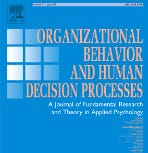New articles in OBHDP (June 18th, 2025)
Politics, ideology, and partisanship in the workplace: A perspective on the literature and a call for submissions
John R. Busenbark, James N. Druckman, Aparna Joshi, Aaron C. Kay, Maryam Kouchaki
https://www.sciencedirect.com/science/article/pii/S0749597825000305
Organizational Behavior and Human Decision Processes (OBHDP) invites submissions—starting now—to a special issue on “Politics, ideology, and partisanship in the workplace,” edited by John R. Busenbark, James N. Druckman, Aparna Joshi, Aaron C. Kay, and Maryam Kouchaki. As detailed in the article, we encourage manuscripts from a variety of traditions, including strategic management, sociology, political science, economics, psychology, organizational behavior, and many others. Given that we are soliciting manuscripts from a wide range of research paradigms, the structure of those manuscripts does not need to precisely conform to what a traditional OBHDP paper “looks like.” (Articles will still be held to the journal’s typical standard of contribution and rigor.) Authors are welcome to recommend any of the guest editors, as well as expert reviewers from their own domains. This is a “virtual special issue,” such that articles will be accepted on a rolling basis and will be published across several regular issues of OBHDP. Accordingly, articles will progress through the review process without the typical delays associated with special issues. Please submit your manuscripts on the OBHDP submission platform and, when prompted, select that your manuscript is intended for this special issue.
This call for submissions is preceded by a detailed, multi-disciplinary perspective on the state of the literature, wherein we take stock of the emerging research on politics, ideology, and partisanship in organizational life. We highlight key developments, identify promising directions for future research, outline the goals of the special issue, provide submission guidelines, and introduce our team of guest editors from a diverse set of disciplines.
A donation-based indicator of political ideology (DIPI): An open dataset for studying the political ideologies of employees, top management teams, CEOs, boards, and industries
Michael J. Mannor, John R. Busenbark
https://www.sciencedirect.com/science/article/pii/S0749597825000317
Given that people don’t leave their political beliefs at the office door, it is important to understand how political ideology shapes workplace attitudes and behaviors. Unfortunately, measuring political ideology has long been a challenge—limiting the scope of research in this space. One effective solution has been to infer political ideology from people’s histories of financial donations to partisan politicians and action committees. Despite the strengths of this “donation-based indicator of political ideology” (DIPI), its use has been limited due to its labor-intensive collection and calculation.
This study offers a game-changing solution: a new, open-access DIPI dataset based on 107 million donation records across 4,133 publicly traded firms in the S&P 1500 between 1992 and 2022. The dataset includes political ideology scores for employees, top management teams, CEOs, and boards. The authors show how these DIPI data can unlock powerful scholarship on political ideology across organizational levels, partisanship within and between firms, ideological (in)congruence among firm actors, industry dynamics, temporal trends, and more.
P.S. if you can’t access the full-text let us (m-kouchaki@kellogg.northwestern.edu or mikebaer@asu.edu) know and we’d be happy to share a copy.


